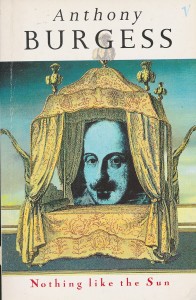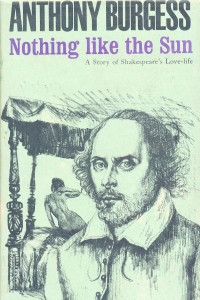Anthony Burgess and Shakespeare
This resource examines some of the ways in which Anthony Burgess thought about and wrote about one of his greatest inspirations.
- Anthony Burgess and Shakespeare
- Burgess and Shakespeare: a brief introduction
- Burgess teaching Shakespeare
- Nothing Like the Sun: a story of Shakespeare’s Love-Life
- The language of Nothing Like The Sun
- Mr WS: Burgess’s Shakespeare ballet
- Fictional Shakespeares
- Burgess’s identification with Shakespeare
- Burgess and Shakespeare: the podcast
The language of Nothing Like The Sun:
When, in 1963, Anthony Burgess finally started work on the novel he had long planned to write, a challenge lay ahead of him. There was never any doubt in his mind that his fictional biography of Shakespeare should be written in a language that was, if not exactly that of the late sixteenth century, then an “approximation to Elizabethan English”. In his essay on the writing of Nothing Like the Sun, ‘Genesis and Headache’, Burgess describes the fear that any attempt at such an approximation could fail, that it might become jarring or even comic to the modern ear, or diminish the authenticity of his characters.
Burgess’s task was to find “a kind of Elizabethan protected from sneerers and carpers by a sort of built-in irony”. The framing device he hit upon – that of an increasingly drunk Mr Burgess giving a farewell lecture to his students in the Far East – gave Burgess that protection. The first reviewers (generally a disappointment to Burgess) paid little heed to this aspect of the novel and failed “to notice the author’s personal monograms sewn into the fabric of the work”. And, although readers ever since have delighted in pointing out apparent anachronisms, the true protection from “sneerers and carpers” comes from the skill and style with which Burgess accomplishes his task. Having spent much of his life reading books from and about the Elizabethan era, Burgess manages to create an authentic-seeming but fresh-feeling language. Nothing Like the Sun is by a writer incredibly well-versed in Shakespeare, who takes great pleasure in finding and employing unusual words from the period and allows his own dialect and the style of his contemporaries to influence and invigorate his work.
At first, Burgess attempted to write the novel in the first-person, as Shakespeare himself. He wrote an entire chapter in this fashion. The request to read that chapter for a radio programme about novelists’ work in progress may have been a great help for Burgess. When he heard the recording, he knew immediately that the style was a mistake: it sounded “like an impersonation and hence insincere”. He shifted the narration into the third person and continued with his work. And in this work, Burgess felt that he was aided by his native tongue. He had an aversion , provoked by the novels of Walter Scott and his ilk, to “the embarrassment of thou and thee”. But the Lancashire of his youth still used a version of those archaic pronouns and these he felt he could employ. In 1930s Manchester you might hear the question “Where’s tha going, lad?” answered by “I’m coming back with thee to thy place”. This old-fashioned manner of address gave Burgess a style that was at once authentic and personal.
Burgess’s twentieth century reading also clearly had a part to play in the creation of that style. Kenneth Toomey in Earthly Powers professes to “like Jim Joyce but not his demented experiments with language”. In Nothing Like the Sun, Burgess borrows the theory that Anne Hathaway cuckolded her husband with his brother, Richard, from Stephen Dedalus in Ulysses. And he embarks upon his own experiment with language, clearly influenced by Joyce and other modernist writers. This is particularly marked when WS is drunk: “Drink, then. Down it among the titbrained molligolliards of country copulatives, of a beastly sort, all, their browned pickers a-clutch of their spilliwilly potkins, filthy from handling of spade and harrow, cheesy from udder new-milked, slash mouths agape at some merry tale.”
This merges Shakespearean and Joycean English to make a new language redolent of both the era it is writing about and that it is written in. Burgess claimed that that new language, however, contained only one new word. He twice uses the word “spurgeoning” to describe the movement of the River Avon under the Clopton Bridge. This neologism “derived from the name of Caroline Spurgeon, a modern scholar, who, in her work on Shakespeare’s imagery, noted that he introduced the peculiar behaviour of the Avon under that bridge as a simile in ‘The Rape of Lucrece’.” Burgess said that all other words were found in “Elizabethan chapbooks, pamphlets, and Shakespeare’s own plays”. A casual reader, even one with the OED at hand, might suspect that “spurgeoning” is not the only invention of Burgess’s.
There are several striking direct quotations from Shakespeare worked into the text. WS is “mewling and puking” after a heavy drinking session, as Jacques’s infant is in his “All the World’s a Stage” speech. Waking to find himself semi-naked in the arms of an unknown woman, WS uses Lear’s dying words, “Never never never never never”. Words employed so poignantly in the great tragedy are put into the mouth of a hungover man. That woman, however, turns out to be Anne Hathaway. That drunken night is the first step on the path to his marriage and, indirectly, to London and to the Globe.
Burgess also uses lines of Shakespeare’s actual sonnets. Disappointed with Venus and Adonis, WS steals himself to finish the dedication, knowing that he “cannot waste [his] life in longing for this man’s art and that man’s scope”. Southampton, his patron and lover, has “power to hurt and he would do it”. It is as if the words of the sonnets are swirling around in his mind, gradually coalescing to create phrases, sentences and quatrains. We even see WS as a critic of his own work, mocking his overwhelming lust for Fatimah while highlighting his clever use of alliteration: “Take this sonnet, also, of the perils of lust (hark to the dog’s panting: had, having and in quest to have)”.
Nothing Like the Sun tells of the early writing of The Comedy of Errors and is explicit about the inspiration for The Merchant of Venice and Romeo and Juliet: “If a poor Jew doctor remains their posthumous villain, why then… they shall have a Jew and set in Machiavellian Italy withal; and Italy will do for this warring families play (well, there is Brooke’s poor poem as a base) which is also of Harry’s friends the Danvers brothers and their war with the Lings. Aye, Montague will come into it, which is a name for the Southamptons.” Other plays are suggested by words and half phrases dropped into the text. WS’s “spaniel’s eyes” are reminiscent of Helena, Demetrius’s “spaniel”. Southampton, dismissive of WS’s anxiety, suggests a future title, “You are making a great ado about very little”. The young WS is certain that a willow (associated with the suicide of Ophelia and the murder of Desdemona) is “right for death”. When WS’s brother Richard chases their sister Anne, she looks “back at her little pursuer, crying, ‘Boar, boar, bristly boar!’”. Hence Burgess hints at what may be the most famous stage direction ever written, “Exit, pursued by a bear”.
Using the words Shakespeare wrote and putting words into Shakespeare’s mouth, Burgess displays a mastery of Shakespeare’s work and of his language. Nothing Like the Sun was of course not the first novel in which Burgess had attempted to create a new linguistic style. The language of the droogs in A Clockwork Orange is one of its most distinctive and successful features. In his biography of Burgess, Andrew Biswell points out that drafts of A Clockwork Orange show that the Nadsat was reworked to make it more ‘Shakespearean’. Burgess changed the line “Aha, I know what you want, I think” to “Aha, I know what thou wantest, I thinkest”. This rather clunky use of “rakish mock Elizabethan” was exactly what Burgess tried to avoid in Nothing Like the Sun. He succeeded; and he even succeeded in working a snippet of Nadsat into the novel: “thereto will be added for good measure a good measure, nay a treasure of good measures, viddy or skiddy lissit a jig, aye, a jig”.
Victoria Brazier




